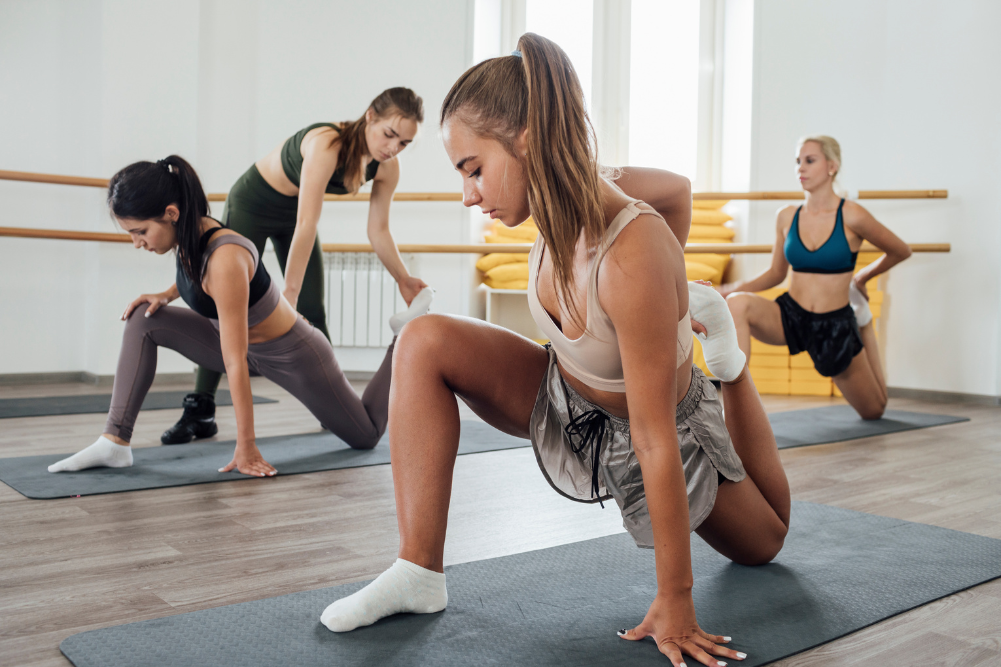Fitness boosts immunity – but you can exercise too much
Everyone wants to live a healthy, high-quality life, especially the ageing Baby Boomers and their Generation X offspring. One only has to scan the bewildering array of health and fitness magazines on the racks to see evidence of the increased importance we put on healthy living.
Physicians have made many claims about the positive effects of exercise on our health, touting fitness as the ideal way to achieve this. Yet most people blindly follow their exercise routines without knowing whether their workouts improve their health and without knowing if they are doing the right things. In many cases, according to the research, fitness buffs may actually be suppressing their immune systems by working out too strenuously.
The rapidly growing body of research into the relationship between health and fitness — more than 600 papers — shows very positive and promising results. Exercise has some amazing benefits to the body in terms of resistance to infection and certain cancers and may possibly even improve your lifespan.
All in moderation
The most exciting finding in the field of exercise immunology is that positive immune changes take place during moderate exercise. People who exercise at a moderate level experience fewer days of sickness from the common cold and other upper respiratory tract infections (URTI). And less competitive athletes and people following lower-key exercise regimens have enhanced immune reactions to infection.
One study found that women who walked briskly for 35–45 minutes, five days a week, for 15 weeks, experienced half the incidence of colds compared with a sedentary control group. A Runner’s World survey showed that 61 per cent of recreational runners reported fewer colds since taking up running and only 4 per cent had experienced more colds.
Another study conducted by the Fred Hutchinson Cancer Research Center in Seattle, US, found that moderate-intensity exercise reduced the incidence of colds among 115 overweight, obese, previously sedentary, post-menopausal women. Their exercise regime consisted of moderate-intensity exercise for five days a week, for 12 months.
A recent study from Hong Kong also found that exercising at low to moderate frequency caused lower influenza-associated mortality. People who exercised at moderate frequencies from once a month to three times a week had lower death rates compared with people who never exercised or seldom exercised.
The moderate advantage
Light or moderate exercise boosts your body’s natural immune system by circulating protective cells through the body faster to attack and eliminate bacteria, viruses and fungi. Infection fighters, such as natural killer cells, macrophages, immunoglobins, white blood cells and other antibodies, are produced in the bone marrow, lungs and spleen and have a clean-up effect on foreign invaders.
Another theory holds that the increase in body temperature when you exercise may inhibit the growth of bacteria, thus reducing its foothold in the body. Some exercise scientists believe regular exercise helps rid the lungs of airborne bacteria and viruses that cause upper respiratory tract infections, while others believe exercise causes the loss of carcinogens through increased sweat and urine loss.
Interestingly, active people also experience lower rates of colon cancer and breast cancer. Researchers believe moderate exercise boosts the body’s immune system, attacking malignancies that have viral origins. In addition, the faster passage of food through people who exercise reduces the time carcinogens are in the digestive tract. Fit people are also less likely to be overweight, which can cause cancers.
The danger of excess
Exercise is a two-edged sword, however. Over-exercising can suppress normal immune function, so getting the right balance of frequency, intensity and duration of fitness workouts is critical. You can go from being vibrantly healthy and energetic to toppling over the abyss by picking up any virus and infections going around if you overdo things.
Overtrained athletes at all levels have been shown to experience impaired immune systems to the extent that they suffer from a higher number of upper respiratory tract infections (URTI) than untrained people.
During Olympic Games, athletes experience URTI at abnormally high levels, according to clinicians. In the 1960 Tokyo Olympics, no fewer than 40 per cent of the athletes were stricken with a nasty flu virus that swept through the games village like the plague, robbing many of medal performances. In the more recent 2000 Sydney Olympics, 33 per cent of the New Zealand team’s visits to medical personnel were attributed to URTI.
URTI is also elevated following competitive endurance races such as marathons and triathlons. One in seven (14 per cent) marathon runners reported an episode of URTI during the week following the 1987 Los Angeles Marathon, compared with two in 100 (2 per cent) of runners who did not compete.
According to research, there’s an “open window” of altered immunity lasting from three to 72 hours after you exercise hard and for longer than 90 minutes. In this time, infectious microbes, viruses and bacteria may overcome your body’s natural defences and gain a foothold.
Scientists notice that the plasma levels of stress hormones such as cortisol and epinephrine go sky-high after heavy exertion, as do anti-inflammatory cytokines. Natural killer cell activity, T lymphocyte levels, neutrophil function and macrophage antigens all experience significant reductions after strenuous activity.
The result of these myriad reactions is a cascade effect that can lead to depressed immune function in the exerciser or athlete who has been over-reaching for extended periods of time.
Clearly, other factors affect our immune systems and health. Our chances of getting sick with a cold depend on other factors, too: age, cigarette smoking, alcohol consumption, obesity, allergies, environmental conditions such as high altitude, extreme heat or cold and air pollution, mental stress, other underlying disease and lack of sleep, to name a few. A study of 852 German athletes found the combined effect of overtraining coupled with mental stress, lack of sleep and weight loss caused a higher level of URTI than just in overtrained athletes.
Interestingly, for athletes, drinking one litre per hour of typical sports drinks has been shown to lower blood cortisol and epinephrine levels, reduce adverse changes in blood immune cells and lower anti-inflammatory cytokine levels. It’s believed that the sugars in these drinks help maintain blood glucose levels and glycogen levels, thus providing the immune cells with enough energy to function maximally during exercise.
However, we all know that refined sugars, sucrose etc are responsible for myriad health problems, including dental caries and rapid blood sugar swings, so you should choose sports drinks that are low in simple, refined sugars and higher in complex carbohydrates such as glucose polymers or corn starch.
Fruit juices such as apple juice and grape juice have also been shown to be as beneficial as sports drinks for performance enhancement and thus, presumably, immune system enhancement. Fruit juices also have the advantage of adding electrolytes and minerals to your diet.
However, if you train hard but within your limits, your URTI risk is typically unaltered. Thus there is a relationship between how much and how hard you exercise and your chances of getting infections.
When you are sick
What about exercising when you have an upper respiratory tract infection such as a head cold, with symptoms like a runny nose and sneezing?
Moderate exercise training during a cold does not appear to prolong or worsen symptoms. A study at Ball State University looked at 34 young men and women who were infected with a cold rhinovirus. No difference was found in symptoms between an exercising group, who ran on treadmills 40 minutes every other day at a moderate intensity while sick, and a resting group. It took both groups the same amount of time to recover from their colds.
Some exercise scientists and epidemiologists use the “above the neck” rule, where if mild symptoms in the mouth, nose and throat are present, it’s OK to exercise, although perhaps at a lower intensity and volume.
However, if the infection has spread to the chest, causing heavy coughing and excessive production of liquid, if temperature is above normal and lymph glands on the neck are swollen, exercise is definitely not recommended. Exhaustive exercise during an infection will enhance the severity of the infection and prolong recovery time. In this situation you’ll need two to four weeks to recover.
How much?
Moderate aerobic activity of 30 minutes almost every day seems to gain the most positive results in research.
Nieman believes brisk walking at about 70 per cent of maximal heart rate for 40 minutes a day will enhance your immune system such that you will have half the chance of contracting URTI compared with non-exercisers. Certainly, doing more than 90 minutes of vigorous activity points to an increase in URTI, so we should stay well below this level.
For fitness joggers, a study found that jogging 10 miles a week was beneficial to the immune system but increasing it to 20 miles depressed the immune system.
Elite athletes and hard-core exercisers may be better off doing one high-intensity workout every two to three days to ensure their bodies recover during that 72-hour open window following heavy workouts when they are more susceptible to infection.
The American College of Sports Medicine has a well-researched position on The Recommended Quantity and Quality of Exercise for Cardiorespiratory Fitness in Healthy Adults that meets the requirements for enhancing the immune system quite nicely. They recommend exercising three to five days a week at 55–65 per cent of maximal heart rate for 20–60 minutes using any activity that uses large muscle groups, including walking, hiking, running, jogging, cycling, aerobic dance/group exercise, rowing, stair climbing, swimming, skating and other endurance sports.
What can you do to minimise your chances of catching a cold?
- Closely monitor your exercise to avoid overtraining and chronic fatigue.
- Do not overdo high-intensity training — runners who train and race at a faster pace have a higher incidence of URTI.
- Eat a well-balanced diet to keep vitamin and mineral levels in the body at optimal levels.
- Use carbohydrate drinks before and after endurance events or during very heavy exercise sessions. Recommended dosage is 30–60g of carbohydrate during exercise. This will lower the impact of the stress hormones on your immune system.
- Get adequate sleep on a regular schedule. Sleep disruption has been linked to lowered immunity.
- Keep your life stressors to a minimum because high stress levels have been linked to URTI.
- Wash your hands with warm, soapy water and minimise hand-to-eye and hand-to-nose contact, especially during cold and flu season.
- Do not exercise in a group exercise setting if you have URTI to avoid spreading it to others.
Roy Stevenson has a Masters degree in coaching and exercise physiology from Ohio University in the US and has been widely published globally on health, fitness, running and sports training.







